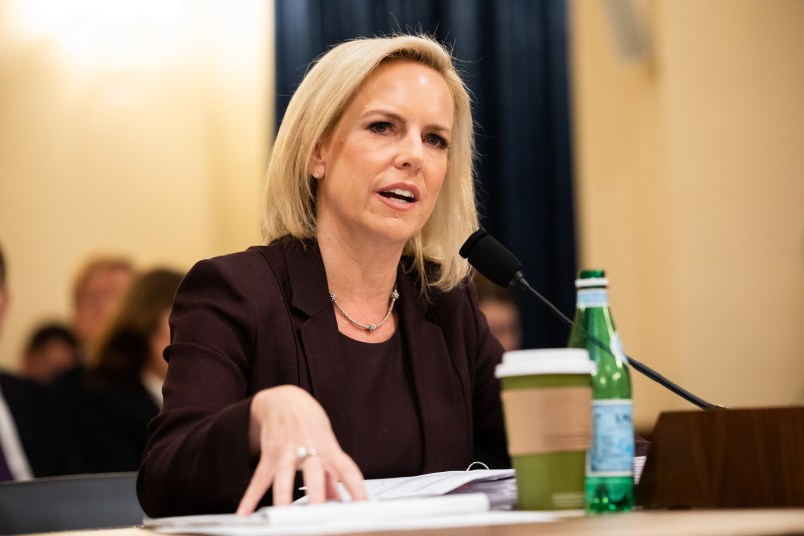President Donald Trump announced in a tweet Sunday that Nielsen would leave the job, and that she would be replaced on an acting basis by the commissioner of Customs and Border Protection, Kevin McAleenan.
….I am pleased to announce that Kevin McAleenan, the current U.S. Customs and Border Protection Commissioner, will become Acting Secretary for @DHSgov. I have confidence that Kevin will do a great job!
— Donald J. Trump (@realDonaldTrump) April 7, 2019
Nielsen posted a resignation letter an hour later:
Its been an honor of a lifetime to serve with the brave men and women of @DHSgov. I could not be prouder of and more humbled by their service, dedication, and commitment to keep our country safe from all threats and hazards. pic.twitter.com/lIQ5iqGDmF
— Sec. Kirstjen Nielsen (@SecNielsen) April 7, 2019
I have agreed to stay on as Secretary through Wednesday, April 10th to assist with an orderly transition and ensure that key DHS missions are not impacted.
— Sec. Kirstjen Nielsen (@SecNielsen) April 8, 2019
It was unclear whether Nielsen resigned voluntarily or was asked to do so. CBS News’ Paula Reid, who first reported the resignation, noted that Trump on Friday withdrew his nominee to be the next director of Immigration and Customs Enforcement — which, like CBP, is housed within DHS — telling reporters: “We’re going in a tougher direction.”
Bloomberg News’ Jennifer Jacobs reported, citing “several” unnamed sources, that Nielsen had been “forced out,” rather than resigning voluntarily.
Trump has said that he likes having “acting” secretaries: “It’s easier to make moves when they’re acting,” he said in February. “It gives me more flexibility.”
McAleenan joins the current leaders of the Defense Department and Interior Department as Cabinet members who are not Senate-confirmed. The President refers to White House budget director Mick Mulvaney the acting White House chief of staff, but has given no reason for doing so; the position requires no Senate confirmation.
Nielsen, a former George W. Bush White House staffer, began her path in the Trump administration as DHS chief of staff, where she formed a close working relationship with then-DHS Secretary John Kelly.
When Kelly took over as White House chief of staff after Reince Priebus left that job in mid-2017, Nielsen moved to the White House as well, becoming principal deputy chief of staff. After several months in which Elaine Duke served as acting DHS secretary, Nielsen was confirmed by the Senate for the position on Dec. 5, 2017 in a 62-37 vote.
Though the DHS secretary is assigned for a vast array of responsibilities — overseeing everything from counter-terrorism efforts measures to natural disaster response — Nielsen’s tenure was marked by her central role in the Trump administration’s family separation policy.
The policy resulted in the separation of thousands of migrant and asylum-seeking families at the border after their apprehension by federal agents. Nielsen played a key role in the family separation crisis: Before the families were separated, border agents had to first refer adults for prosecution for misdemeanor illegal entry.
Once those court proceedings took place — the role of then-Attorney General Jeff Sessions’ Department of Justice — the families were separated: Because children cannot be held in criminal detention with adults, they were turned over to the Department of Health and Human Services.
On Sunday, in an ongoing lawsuit over the family separation crisis, the Trump administration said it could take up to two years to reunite families that remain separated.
A DHS inspector general’s probe published in October last year found that the agency “was not fully prepared to implement the Administration’s Zero Tolerance Policy or to deal with some of its after-effects.”
Among the more damning findings in the report: The administration “limited the volume of asylum-seekers” at ports of entry, which “likely resulted in additional illegal border crossings” from asylum-seekers. Per the report, children were held in DHS’ infamous short-term detention centers for days longer than allowed by law. The agency failed to share data on separations with HHS, delaying family reunifications after a judge ordered them. And parents were in many cases kept in the dark about their children’s whereabouts.
Border agents, the inspector general’s probe found, did “not appear to take measures to ensure that preverbal children separated from their parents can be correctly identified.”
Also, “CBP may have been able to avoid separating some families,” but instead, “arranged to have adults transferred directly from court to ICE custody [after they plead guilty to a criminal violation], rather than readmitting them [to CBP custody] where they might be reunited with their children.”
“According to a senior official who was involved with this decision,” the inspector general’s probe found, “CBP made this change in order to avoid doing the additional paperwork required to readmit the adults.”
The family separation policy, while the most prominent story of Nielsen’s tenure, was far from the only newsworthy one.
Nielsen also formally announced the decision to end “temporary protected status” — legal residency in the United States for certain foreign nationals affected by natural disasters or other emergencies — for hundreds of thousands of people; those moves are currently tied up in court.
And she’s continued to attempt to stem the flow of asylum-seekers at the southern border through a series of procedural and legal changes, which have been met with legal challenges by the ACLU and immigrant rights groups.
This post has been updated.



